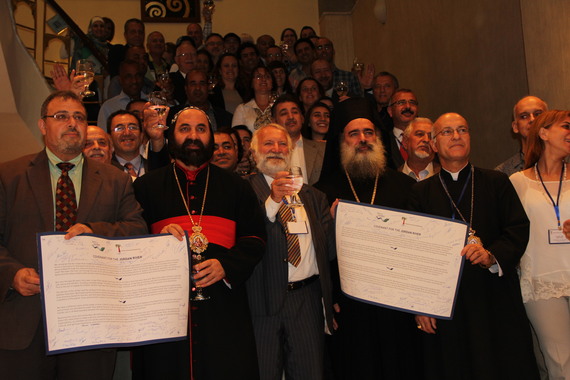This post is co-authored by Jeff Odell Korgen.
Most of the run-up to Pope Francis' ecology encyclical Laudato Sii (Praised Be), due to appear on June 18, has focused on issues of natural ecology like climate change, fracking, and mining. But the encyclical will also call our attention to human ecology --how we treat each other -- and its relationship to the environment. Pope Francis calls this "integral ecology." An interfaith campaign in the Jordan River Valley illustrates the concept.
EcoPeace brings together Jordanian, Palestinian, and Israeli leaders to protect their shared regional environment. By doing so EcoPeace also promotes the conditions necessary for peace by organizing sustainable development. Its educational campaign about the environmental challenges facing the Jordan River encourages all people of the region to participate in joint efforts to restore an important spiritual symbol.
The interfaith campaign of EcoPeace brings Christians, Muslims and Jews on educational tours of the Lower Jordan River where they learn about the river's religious significance in the Abrahamic traditions. EcoPeace inspires action-based community responses by showing the environmental reality of the river. It has also engaged religious and community leaders, and regional governments in signing and implementing the Covenant for the Jordan River, a statement that calls for the restoration of the Jordan Valley.
Efforts like those of EcoPeace come at a critical moment in human history. Environmental degradation and climate change have become the focus of concern for people of all faiths worldwide. The upcoming encyclical will not only be a document for Catholics but will inspire all people of good will to become, in the Pope's words, "Protectors of Creation."
To underscore the need for protectors of Creation, Pope Francis has often referred to Genesis 2:15 where the human, the adam (more literally the "earthling") is put in the Garden of Eden by God to "till it and keep it" or, as another translation says, "to till it and to tend it." For Pope Francis the concepts of "tilling" and "keeping" stand for a reciprocal relationship between humanity and Creation in which humans have a "sacred duty" to use the goodness of the earth only in a way that ensures that future generations will also enjoy Creation's bounty.
This interpretation of Genesis 2:15 is echoed in Jewish sources where the Hebrew word translated as "to till," (leovda) has a basic meaning of "to work," but can also mean "to serve" or to "worship." The second word, "keep" or "tend," (leshomra) has a core meaning of "guard" or "protect." The Earth can serve us, but we also must to serve the earth and preserve it for future generations. This call to serve, be served and protect for the future correlates with the standard definition of sustainable development: meeting the needs of the present generation without jeopardizing the ability of future generations to meet their own needs.
Pope Francis has also utilized the New Testament portrayal of Joseph, the father of Jesus, as the model of how someone can become a "protector," respecting all of the creatures of Creation, including all people.
Pope Francis has noted that protectors of creation need to become protectors of people too. This is what integral ecology is all about. The kind of cooperation and peacebuilding that Ecopeace has built in the Jordan Valley stands as a shining example of integral ecology -- where peacebuilding and protection of Creation meet.
We see this also in Yeb Sanyo's pilgrimages to ecologically vulnerable sites around the world which will end up in Paris in time for the beginning of the climate treaty talks in early December. Yeb's walks are part of the OurVoices' People's Pilgrimage campaign that anyone can join through a visit to a personally meaningful site.
OurVoices is also co-sponsoring a march in Rome on Sunday, June 28, when thousands of Catholics, people of diverse faiths, and people of goodwill will walk from Piazza Farnese to St. Peter's Square in Vatican City. The march, One Earth, One Human Family, will thank Pope Francis for his encyclical and call for action on climate change by world leaders. It will also be an epic celebration to show how deeply faith communities care about climate change.
It is time for all of us to stand up, speak out and become protectors of Creation. In the Book of Genesis the Jordan River valley is described as a "garden of God" (13:10) and is the place where Joshua led the Israelites into the Holy Land. It is the place where the New Testament says John the Baptist baptized Jesus. Several of the Prophet Muhammad's companions were buried on its eastern shore. Just as Israelis, Palestinians and Jordanians are trying to be protectors of Creation in their work in the Jordan River valley, so must all of us, inspired by their example and by Pope Francis' encyclical, become the protectors of the whole of the Earth and of one another.
Faith Leaders Supporting the Rehabilitation of the Jordan River
(Picture Courtesy of EcoPeace)
This is the third in a series of posts on the encyclical by Jeffry Odell Korgen & Rabbi Lawrence Troster who are engaging Catholic and Jewish communities in OurVoices, the international, multi-faith climate campaign.
